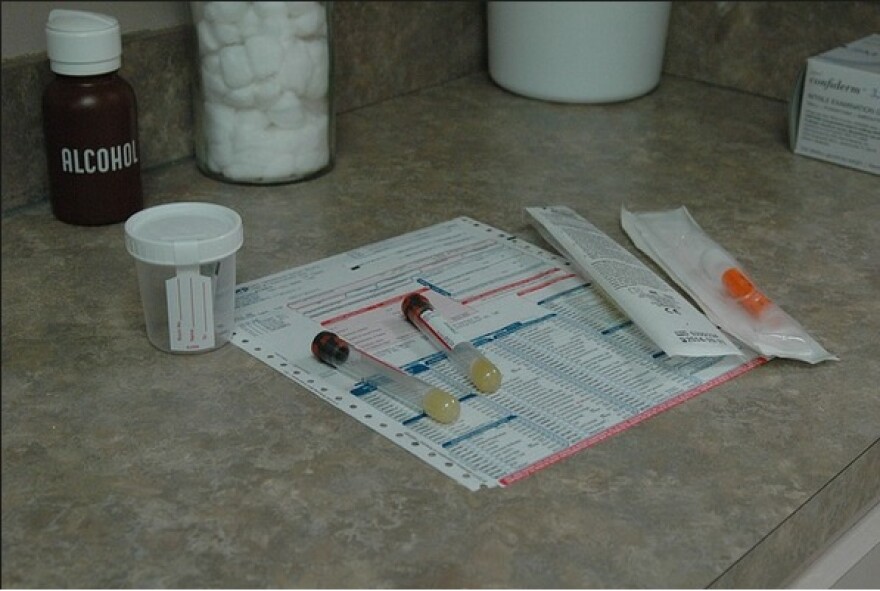There’s a new bill that would drug test Ohioans receiving some state benefits. Previous similar bills have been shot down in past general assemblies, but the sponsors say this legislation is different.
Republican Representative Ron Maag is one of the sponsors of a bill that would allow drug testing of Ohioans who are part of the state’s OhioWorksFirst program.
“Right now, if someone is addicted to drugs, they may be getting the money, they might be giving it to the drug dealer and their family is still suffering. This is to take care of the families and to get help for the person who is addicted to drugs,” Maag says.
Maag and the other Republican sponsor of this bill, Representative Tim Schaffer, contend this legislation is not punitive.
Under the bill, all recipients would go through an initial screening process that would determine whether the recipient should take an actual urine drug test. Then if that person fails the drug test, two things happen. One, someone would take responsibility to make sure the family of the person who failed the drug test actually gets the financial benefits from the program and two, the person who tested positive would be put into drug treatment.
That person could not collect the state aid until they test clean again.
There is $100,000 set aside to help each person who needs treatment. Most of these details….which screening process….which drug test…who would take over responsibility for overseeing the family…are not in this bill at this early stage. The plan would be put in place in three counties as part of a pilot program that could later be expanded statewide.
Schaffer says this would save lives of drug-addicted Ohioans but would also save Ohio money. He says just look at Utah, a state that saved $369,000 in the first year of its drug testing program.
“And if you look at just the few folks that tested positive and were denied benefits, those individuals that were denied benefits, it would be hard to extrapolate $369,000. But if you look at the folks who did not come back once they found out there was a drug screening and a drug test, and they didn’t come back to complete the application process, that was almost 12 percent of the people who applied, who started the application process, 554 to be exact out of 4,730,” Schaffer says.
But like the ones that came before it, this drug testing bill faces opposition, despite the changes in this plan. Lisa Wurm with the American Civil Liberties Union of Ohio says her group has problem with the premise of it.
“We make very crude and unfair assumptions that people on public benefits are drug users or are addicted to drugs,” Wurm says.
Opponents of this legislation point out there are less than 16,000 adults on the Ohio Works First program but, with the children involved, that number grows to about 110,000. And they note there are about 1.6 million Ohioans who live below the poverty line.
They contend drug use among poor and wealthier Ohioans is about the same, so there’s no reason to single this population out in this legislation. And opponents take issue with the part of the bill requiring treatment for those who test positive.
Democratic Senator Charleta Tavares says she gets phone calls from constituents who tell her there is not enough drug treatment.
“They have somebody ready to get into treatment and they can’t get into treatment unless they are inebriated, under the influence of a substance and many of them are trying to get into treatment by committing petty crimes, thinking if they go to jail, that way they will get into treatment. I had a case like that a couple of weeks ago,” Tavares says.
Tavares says the state needs to devote more money to drug treatment facilities so that they can meet the current needs without imposing legislation to add more people to an already overcrowded system. In the past, some Democratic lawmakers have suggested that lawmakers, themselves, be tested for drugs as part of this plan. Would Maag and Schaffer be willing to do that?
“I have no problem with it,” Maag says.
“I don’t either,” Schaffer adds.
Fifteen other state lawmakers have signed on to support this bill. Gov. John Kasich was among those who raised concerns about a similar bill when it was proposed in 2011, but then announced he’d support a pilot program to drug-test some recipients the following year. Neither the bill or the pilot program were approved.

